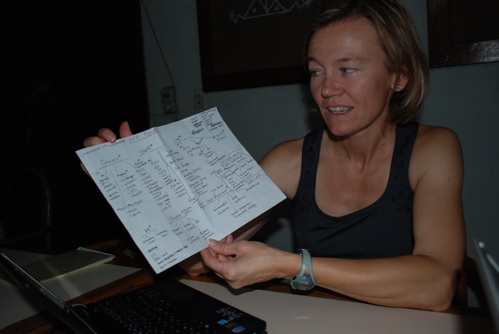And so Dr. Tiffany Keenan, an emergency room doctor from Bermuda, did so at the Jacmel airport in the days and weeks immediately following the January 12 earthquake in Haiti. Keenan looks like she weighs about 100 pounds soaking wet, but don't let that fool you. Not only did she coordinate air traffic and relief deliveries with the Canadian military, she also managed to update a database of health clinics in the region--all within five weeks time. As a direct result of her tenacity and take charge attitude, many emergency supply flights were able to land, and she immediately placed doctors and nurses on choppers to assist in areas most in need. Meanwhile, everything and everyone else was bottled up in the Dominican Republic or at the heavily damaged Port-au-Prince airport.
We met her after conversing with Namita Kumar, her logistics coordinator at Haiti Village Health. Kumar was sharing an internet connection with us at a hotel in Petionville while we were uploading some stories and photos. When she heard about an IDP camp we visited that was in desperate need of medical care, she forwarded our videos and photos to Dr. Keenan who got back to us within hours, wanting to meet and share information. Timing was dicey, since we were all moving quickly, but a missed flight left the doctor in Port-au-Prince for an unplanned night. So, we secured a room for her and headed out to dinner to get acquainted.
Canadian-born Keenan is all rapid-fire talk and earnest blue eyes. Taking notes resulted in my pen tearing the paper several times as it skidded across the surface in a desperate attempt to keep up with her enthusiasm, ideas, and heart-felt passion for the Haitian people. She founded Haiti Village Health, in 2006 with the hope of creating a sustainable medical infrastructure staffed by Haitians and not foreign NGOs.

The water glasses had yet to appear on the table before the doctor showed us the most important piece of paper in her possession. It looks like she talks--a maze of ideas and logistics combined with a veritable warren of associations that form her plan for health coordination in rural Haiti. Keenan decries the "band-aid" approach of foreign aid, which may dress the wound, but does nothing to solve the very real problems faced by Haitian society.
A nationally recognized NGO coordinator is one of her dreams for Haiti. This requirement is especially evident in the aftermath of the earthquake. Keenan says that it was only she and the Salvation Army who spoke with the local Senator about relief coordination. After working in Haiti for over four years she says, " It has taken me a long time to realize that for real change to happen in the long run, you must work with the Haitian government."
During the confusion, chaos and ongoing lack of emergency healthcare coordination, Dr. Keenan encountered some NGO missionary groups that she found to be standoffish and has concerns that one group in particular was doing field amputations with no anesthesia. We have heard similar reports, so her account rang true. "There were six hospitals in operation where they could have taken these patients," she said.
The end result is that Keenan now sees a need for "an NGO police."
"We need more coordination. Why set up a new clinic within two minutes walking distance from an existing one?"
The answer is obvious, but this kind of duplication of services and stockpiling of supplies without matching resources with needs is common these days in post-catastrophe Haiti.
She is hoping Haiti Village Health will get government recognition as an NGO liaison--her polite term for the "NGO police."
Keenan is especially critical of NGOs that "overstate what they have done since the quake. They want their names stamped all over this (disaster)." What she says is true. The logos of international "charitable" organizations are more numerous than the number of tents in the IDP camps. Make no mistake about it charity is "corporate business" in Haiti.
Doctors Without Borders has crossed her steadfast path more than once, and it appears that the fiery Keenan is beginning to make an impression.
"I'm a bit of a cowboy, " she laughs.
No kidding.
A Doctors Without Borders (Medecins Sans Frontiers) representative initially told her that the French NGO was not going to cooperate with the local Haitian hospital. "Then two or three days later, they showed up and said they were going to TAKE OVER THE HOSPITAL," she says.
It did not take much more for Keenan to "get into a heated discussion with them," and within six days MSF was talking with the Community Coalition for Haiti about what Haitians wanted for Haitians. Keenan did not mention whether she rode a white horse and lassoed and hog-tied the French doctors in the process.
(Note: You can view every article as one long page if you sign up as an Advocate Member, or higher).





